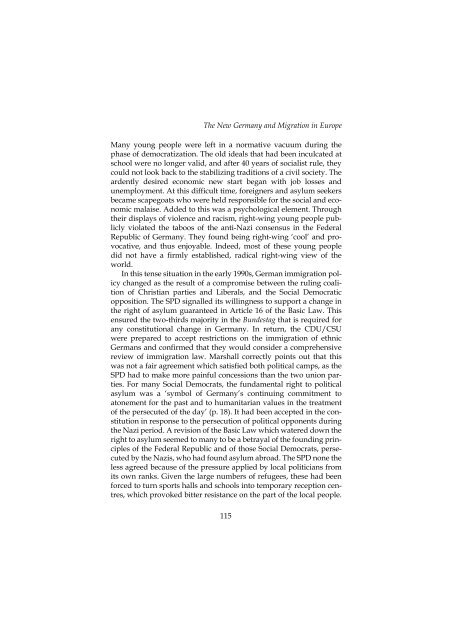Download - German Historical Institute London
Download - German Historical Institute London
Download - German Historical Institute London
You also want an ePaper? Increase the reach of your titles
YUMPU automatically turns print PDFs into web optimized ePapers that Google loves.
The New <strong>German</strong>y and Migration in Europe<br />
Many young people were left in a normative vacuum during the<br />
phase of democratization. The old ideals that had been inculcated at<br />
school were no longer valid, and after 40 years of socialist rule, they<br />
could not look back to the stabilizing traditions of a civil society. The<br />
ardently desired economic new start began with job losses and<br />
unemployment. At this difficult time, foreigners and asylum seekers<br />
became scapegoats who were held responsible for the social and economic<br />
malaise. Added to this was a psychological element. Through<br />
their displays of violence and racism, right-wing young people publicly<br />
violated the taboos of the anti-Nazi consensus in the �ederal<br />
Republic of <strong>German</strong>y. They found being right-wing ‘cool’ and provocative,<br />
and thus enjoyable. Indeed, most of these young people<br />
did not have a firmly established, radical right-wing view of the<br />
world.<br />
In this tense situation in the early 1990s, <strong>German</strong> immigration policy<br />
changed as the result of a compromise between the ruling coalition<br />
of Christian parties and Liberals, and the Social Democratic<br />
opposition. The SPD signalled its willingness to support a change in<br />
the right of asylum guaranteed in Article 16 of the Basic Law. This<br />
ensured the two-thirds majority in the Bundestag that is required for<br />
any constitutional change in <strong>German</strong>y. In return, the CDU/CSU<br />
were prepared to accept restrictions on the immigration of ethnic<br />
<strong>German</strong>s and confirmed that they would consider a comprehensive<br />
review of immigration law. Marshall correctly points out that this<br />
was not a fair agreement which satisfied both political camps, as the<br />
SPD had to make more painful concessions than the two union parties.<br />
�or many Social Democrats, the fundamental right to political<br />
asylum was a ‘symbol of <strong>German</strong>y’s continuing commitment to<br />
atonement for the past and to humanitarian values in the treatment<br />
of the persecuted of the day’ (p. 18). It had been accepted in the constitution<br />
in response to the persecution of political opponents during<br />
the Nazi period. A revision of the Basic Law which watered down the<br />
right to asylum seemed to many to be a betrayal of the founding principles<br />
of the �ederal Republic and of those Social Democrats, persecuted<br />
by the Nazis, who had found asylum abroad. The SPD none the<br />
less agreed because of the pressure applied by local politicians from<br />
its own ranks. Given the large numbers of refugees, these had been<br />
forced to turn sports halls and schools into temporary reception centres,<br />
which provoked bitter resistance on the part of the local people.<br />
115













